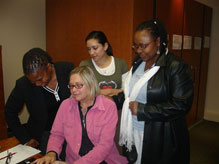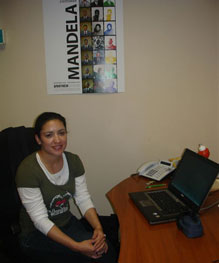
From left: archivists Zanele Riba and Lucia Raadschelders, sitting, Victoria Hill, back and Information Resources Officer Boniswa Nyati
August 18, 2009 – The Nelson Mandela Foundation’s Centre of Memory and Dialogue has bade farewell to a Canadian intern who has spent her vacation working in its archive.
Victoria Hill’s three-month stint as a volunteer is part of an agreement with the University of Toronto’s Faculty of Information.
Hill, who will next month begin her second year of Archives and Records Management studies, was selected from a group of about five who applied to intern at the Nelson Mandela Foundation. Applicants had to have a first-year average of A minus and had to have completed a minimum and maximum number of courses.
“I applied because the colonial history of Africa interests me. I find that there are similarities with our colonial history in Canada and the First Nations people as well as the legacy of that within the archives profession,” said Hill.
A member of the Oneida Nation of the Thames, Hill brought with her a fresh angle to viewing archival work, said Verne Harris, Programme Manager of the Centre of Memory. “Her perspective of indigenous ways of knowing archive from Canada was useful to us as we engage in our own archive,” he said.
While at the Foundation, Hill arranged and described the papers that Nelson Mandela accumulated while he facilitated the Burundi Peace Process.

Canadian intern Victoria Hill in the Nelson Mandela Foundation’s archives room
She described the Centre of Memory as “innovative” because it is “not all about bringing the materials to a central location”. She said the Centre of Memory “does the physical part to a certain degree but makes links with external resources”.
Apart from working on Mr Mandela’s Burundi papers, Hill also helped out with the Dialogue Programme’s work on World Refugee Day on June 20, its Nelson Mandela Annual Lecture on July 11 and with Mandela Day on July 18 – Mr Mandela’s 91st birthday.
“It’s a fast-paced place,” she said. “To put it lightly.”
One of the highlights of Hill’s trip – which included down time in KwaZulu-Natal and in Cape Town – was meeting Mr Mandela. During that visit she presented him with a hand-woven black ash bark basket. “He read the entire card that explained about the Oneida community,” she said.
Meeting Mr Mandela, “although important, was not really required of being here. I know that he’s in a stage now where he needs to do what he wants to do.”
During her visit to Cape Town, Hill toured Robben Island, where Mr Mandela was incarcerated for 18 of his 27 years in prison. She was impressed by the work done to present a message of “forgiveness and beginnings” from a place of immense oppression and suffering.
“I think it is because they have former political prisoners conducting the tours,” she said. “It does not sound scripted at all.”
Hill believes her time at the Nelson Mandela Foundation has helped to sharpen her original aim of ultimately developing records management and archives programmes within First Nations communities.
“Since experiencing South Africa I feel more like I have a responsibility toward the political situation as well,” she said, referring to the relationship between the Canadian government and that country’s native communities. “It is a really overwhelming responsibility to face. I have to reassess now that I have been introduced to the possibility that I can make a bigger contribution than I first imagined.”
As she prepared to depart for Canada she said: “Thank you for many different things … It’s hard even to put into words because I have just been absorbed in the culture of the office … I’ll be reliving moments for a long time – and learning.”